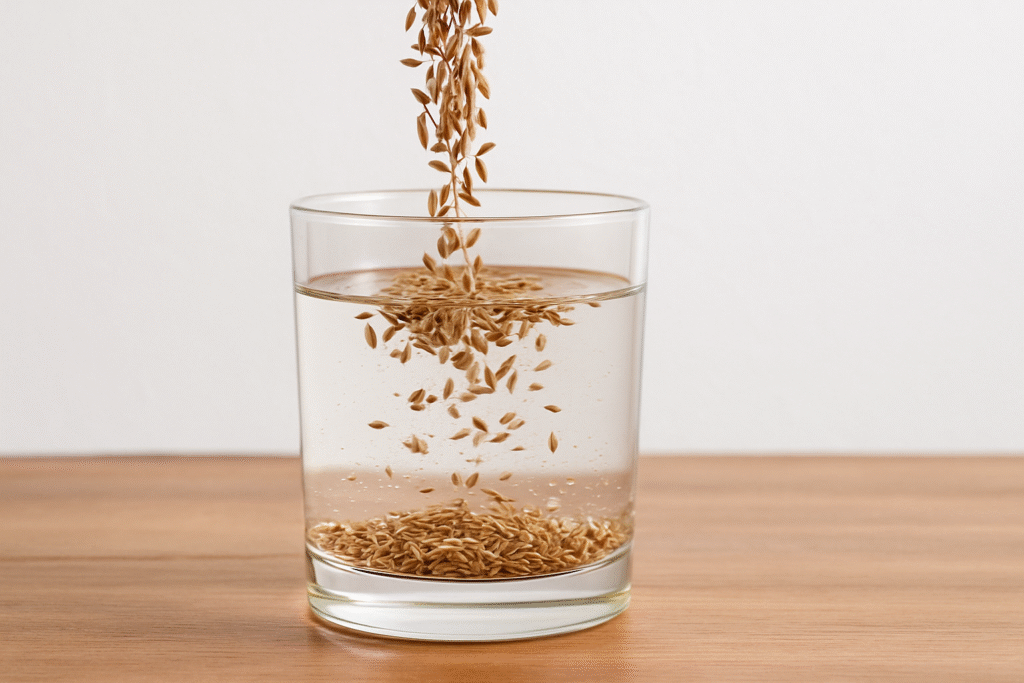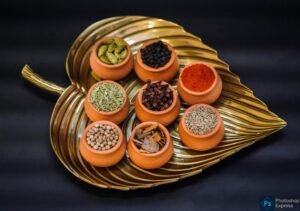What is Jeera Water?
Jeera water is a traditional Indian drink made by soaking or boiling cumin seeds (known as jeera in Hindi) in water. It’s widely used in Ayurvedic and home remedies for its digestive and detoxifying properties. While it might seem simple—just cumin and water—this concoction is a powerhouse of healing when consumed regularly and in the right way.
Jeera vs Cumin: Are They the Same?
Yes—jeera is simply the Hindi word for cumin. Both refer to the dried seeds of the Cuminum cyminum plant, which belongs to the parsley family. Cumin is known for its warm, earthy flavor and is used globally in cooking. In India, it’s also been revered for its medicinal qualities for thousands of years.
Why is Jeera Water So Popular Today?
The rising popularity of jeera water comes from its blend of ancient wisdom and modern wellness goals. It’s seen as a natural aid for:
- Weight loss
- Digestive health
- Detoxing the liver
- Glowing skin and better metabolism
It’s easy to make, low-cost, and caffeine-free—making it a popular replacement for sugary drinks or fad detox teas.
Ayurvedic Significance of Jeera Water
In Ayurveda, jeera is known to balance the Vata and Kapha doshas and stimulate the Agni (digestive fire). This makes it ideal for improving digestion, flushing toxins (ama), and enhancing nutrient absorption. It’s also considered mildly warming and grounding, making it useful during seasonal transitions or sluggish digestion.
Top Health Benefits of Jeera Water
Jeera water isn’t just a trendy wellness drink—it’s a time-tested remedy backed by both Ayurveda and modern nutritional science. Here’s a breakdown of the top benefits you can expect when you make it a part of your daily routine.
Jeera Water Improves Digestion and Gut Health
Cumin stimulates the production of digestive enzymes, which help break down food and speed up digestion. Jeera water is especially effective if you often feel bloated, constipated, or heavy after meals. It also supports the growth of good gut bacteria, which improves overall digestion and nutrient absorption.
Jeera Water Aids Weight Loss and Fat Burn
Jeera water is often consumed on an empty stomach to kickstart metabolism and support fat burning. It’s not a magic bullet, but it helps in two key ways:
- Suppresses hunger naturally.
- Reduces water retention and bloating.
Combined with a calorie-controlled diet and exercise, it can boost your weight loss efforts.
Jeera Water Detoxifies the Body
Jeera has natural detoxifying properties that help flush out toxins from the liver and kidneys. Drinking jeera water regularly supports better organ function, clearer skin, and improved energy levels—all signs that your detox pathways are working well.
Jeera Water Regulates Blood Sugar Levels
Studies suggest that cumin may help improve insulin sensitivity and reduce post-meal blood sugar spikes. This makes jeera water a smart addition for people trying to manage blood sugar levels or reduce their risk of Type 2 diabetes. (Tip: Always consult a doctor before using it as a remedy.)
Jeera Water Boosts Immunity
Jeera is packed with antioxidants, iron, and antibacterial compounds. These nutrients strengthen your immune system and help your body fight off infections, especially during seasonal changes or high-stress periods.
Jeera Water Supports Skin Health and Hydration
The antioxidants in jeera help fight oxidative stress, which is a major cause of dull skin and premature aging. Combined with increased hydration from the water itself, jeera water promotes a natural glow and can reduce acne caused by internal inflammation.
Jeera Water Reduces Inflammation and Bloating
Cumin has proven anti-inflammatory properties. If you suffer from chronic bloating, gas, or mild gut inflammation, jeera water can provide relief by calming the digestive tract and improving peristalsis (intestinal movement).
How to Make Jeera Water (With Variations)
Making jeera water is incredibly simple—and versatile. You can soak, boil, or infuse cumin seeds to suit your taste and routine. Let’s explore the different methods and how each one slightly changes the flavor and potency of the drink.
Soaked (Overnight Method)
Method:
- Add 1 teaspoon of jeera to a glass of water.
- Cover and let it soak overnight at room temperature.
- Strain and drink it first thing in the morning.
Why it works:
Soaking softens the seeds and allows the active compounds to diffuse slowly into the water. The taste is mild, making it a great option for beginners or those with sensitive stomachs.
Boiled (Quick Brew Method)
Method:
- Boil 1 teaspoon of jeera in 2 cups of water for 5–10 minutes.
- Let it cool slightly, strain, and drink warm.
Why it works:
Boiling extracts more oils and nutrients from the seeds. The result is a more robust flavor and faster effect. Ideal for digestion support or cold mornings.
Cold Infusion / Slow Steep Method
Method:
- Add 1 tsp jeera to a bottle of water.
- Leave it in the fridge for 6–8 hours or overnight.
- Sip throughout the day.
Why it works:
This method is refreshing and allows slow release of flavor and nutrients. It’s perfect for summer or when you want a mild, hydrating detox drink.
Jeera Water with Lemon, Honey, or Ginger
Lemon:
Adds vitamin C and enhances fat-burning. Squeeze half a lemon into warm jeera water.
Honey:
Improves taste and adds soothing antibacterial properties. Add only after the water cools slightly to preserve nutrients.
Ginger:
Boosts metabolism and adds a spicy kick. Grate a small piece into boiling water along with jeera.
Optional Add-ons:
- Tulsi (holy basil) for immunity
- Mint for freshness
- Cinnamon for blood sugar support
Best Time to Drink Jeera Water
Timing can amplify the effects of jeera water. Depending on your health goals—weight loss, better digestion, or detox—here’s when you should consider drinking it.
Morning on Empty Stomach
Why it works:
Drinking jeera water first thing in the morning stimulates digestion, jumpstarts your metabolism, and hydrates your body after 7–8 hours of sleep. This is the most common and effective time to consume it, especially if your goal is weight loss or detox.
Bonus Tip: Add a few drops of lemon for an extra fat-burning boost.
Before Meals for Digestion
Why it works:
Jeera water acts as an appetizer by stimulating digestive enzymes. Drinking it 15–30 minutes before a meal can help reduce bloating, enhance nutrient absorption, and prevent post-meal sluggishness.
At Night for Metabolism & Sleep
Why it works:
For some, drinking a warm cup of jeera water at night helps relax the stomach and reduce acid reflux. Cumin also contains trace amounts of melatonin and magnesium, which may support better sleep quality. Just be cautious—if it makes you pee frequently, it might disrupt sleep instead.
Here’s the next section, diving into precautions and side effects:
Jeera Water Side Effects & Who Should Avoid It
While jeera water is generally safe for most people, like any natural remedy, it’s not one-size-fits-all. Overconsumption or certain medical conditions can make it less suitable—or even harmful—for some individuals.
Potential Side Effects of Overconsumption
- Low Blood Sugar (Hypoglycemia):
Cumin can lower blood sugar levels. Too much jeera water—especially if you’re on diabetes medication—might cause sudden dips, leading to dizziness, fatigue, or shakiness. - Heartburn or Acid Reflux:
Though jeera water often eases acidity, excessive intake may actually irritate the stomach lining in sensitive individuals. - Allergic Reactions:
Rare, but some people may experience skin rashes or itching due to cumin allergy. If you notice symptoms, stop immediately. - Kidney Strain:
Large quantities of any detox drink—including jeera water—can put stress on the kidneys, especially if you’re not balancing it with food intake and rest.
Who Should Avoid Jeera Water?
- Pregnant or Breastfeeding Women:
In high doses, cumin may act as a uterine stimulant. Moderate amounts are generally fine in cooking, but regular concentrated jeera water should be avoided unless approved by a doctor. - People on Blood Sugar Medication:
As mentioned earlier, cumin can affect insulin sensitivity. Diabetics should consult their physician before adding cumin water to their daily routine. - People with Ulcers or Sensitive Gut Linings:
Cumin is mildly spicy. If you’re recovering from ulcers, gastritis, or IBS flares, it might be best to wait or use a weaker infusion (like the soaked method).
Jeera Water vs Other Herbal Waters
While cumin water stands strong on its own, it’s often compared to other herbal infusions like fennel water, lemon water, and ginger-turmeric tea. Here’s how it stacks up in terms of benefits, taste, and ideal use cases.
vs Fennel Water
Jeera Water:
- Best for digestion, metabolism, and detox.
- Has a mildly bitter, earthy taste.
- Slightly warming in nature.
Fennel Water (Saunf Water):
- More soothing for acidity, bloating, and gas.
- Sweeter in taste, often easier to sip throughout the day.
- Cooling in nature—ideal for summer and Pitta imbalance in Ayurveda.
Verdict:
Jeera is more active and stimulating. Fennel is calming and carminative. Use jeera for jumpstarting digestion, fennel for calming it.
vs Lemon Water
Jeera Water:
- Provides minerals like iron, copper, and antioxidants.
- Acts on metabolism, bloating, and fat burning.
- Helps cleanse the liver and support nutrient absorption.
Lemon Water:
- Rich in vitamin C, great for immune health.
- Alkalizing effect on the body (despite being acidic).
- Promotes hydration and acts as a mild diuretic.
Verdict:
Lemon water is more hydrating and immune-focused. Jeera water is more gut-focused and metabolically active. Combine them for a power drink.
vs Ginger-Turmeric Tea
Jeera Water:
- Easier on the system; ideal for daily use.
- Helps with everyday digestive discomfort.
- Doesn’t need sweeteners to taste okay.
Ginger-Turmeric Tea:
- Strong anti-inflammatory, good for pain, colds, and immunity.
- Spicier and more potent—can irritate sensitive stomachs.
- Best used therapeutically rather than daily.
Verdict:
Jeera water is your gentle daily cleanser. Ginger-turmeric tea is your go-to when sick or inflamed.
Frequently Asked Questions (FAQs)
This section answers the most common queries people have about jeera water—straight, simple, and search-friendly.
How many times a day can I drink it?
1–2 times a day is ideal. Most people drink it once in the morning on an empty stomach. If you’re targeting weight loss or digestion, a second cup before lunch or dinner is fine. Don’t overdo it—balance is key.
Does jeera water reduce belly fat?
Cumin water alone won’t melt belly fat. However, it helps reduce bloating, improve digestion, and support metabolism—factors that can indirectly reduce belly fat when paired with a calorie deficit and physical activity
Can I drink jeera water during pregnancy?
In small culinary amounts, yes. But daily consumption of concentrated jeera water is best avoided without your doctor’s approval. Cumin may stimulate uterine activity in high doses.
Can I replace it regular water?
No. Jeera water is a supplement, not a substitute. You still need plain water to stay hydrated. Use jeera water as a morning ritual or digestive aid—then drink plain water as usual throughout the day.
What happens if I drink jeera water every day?
If consumed in moderation, daily cumin water can support better digestion, reduced bloating, regular bowel movements, and improved skin over time. Just make sure your overall diet supports your health goals too.
Here’s the final section to close the article powerfully and tie it all together:
Looking for High-Quality Jeera?

Not all jeera is created equal. For the best flavor and health benefits, choose unpolished, naturally sun-dried jeera sourced from trusted farmers. Fresh, aromatic seeds make a noticeable difference in both taste and potency—especially when used in detox drinks like jeera water.
Explore our Spice Tree Jeera (Cumin) here and elevate your daily wellness ritual.
Final Thoughts: Is Jeera Water Worth Including in Your Routine?
Cumin water is one of those rare home remedies that checks every box—it’s simple, effective, affordable, and deeply rooted in both tradition and science. Whether you’re looking to improve digestion, detox naturally, support weight loss, or just feel lighter and more energetic, this humble cumin-infused drink has something to offer.
But like any wellness habit, consistency matters more than intensity. You don’t need to chug gallons or chase extreme results. Just one glass of cumin water in the morning can quietly work its magic—balancing your gut, boosting metabolism, and supporting your overall well-being.
Start small. Listen to your body. And if it feels good, make it a daily ritual. After all, some of the best health upgrades come not from expensive supplements, but from going back to the basics.




